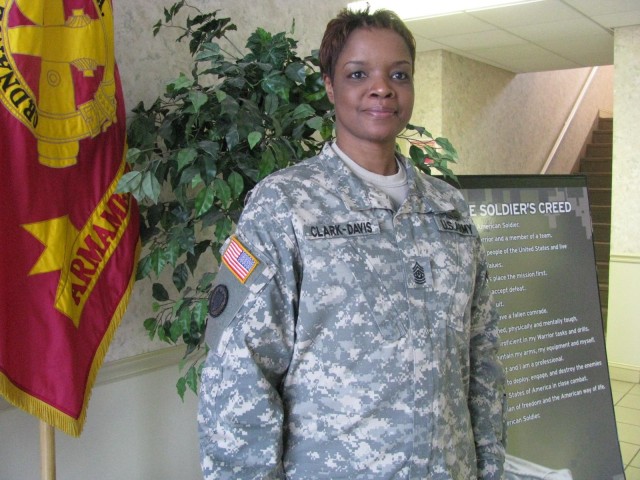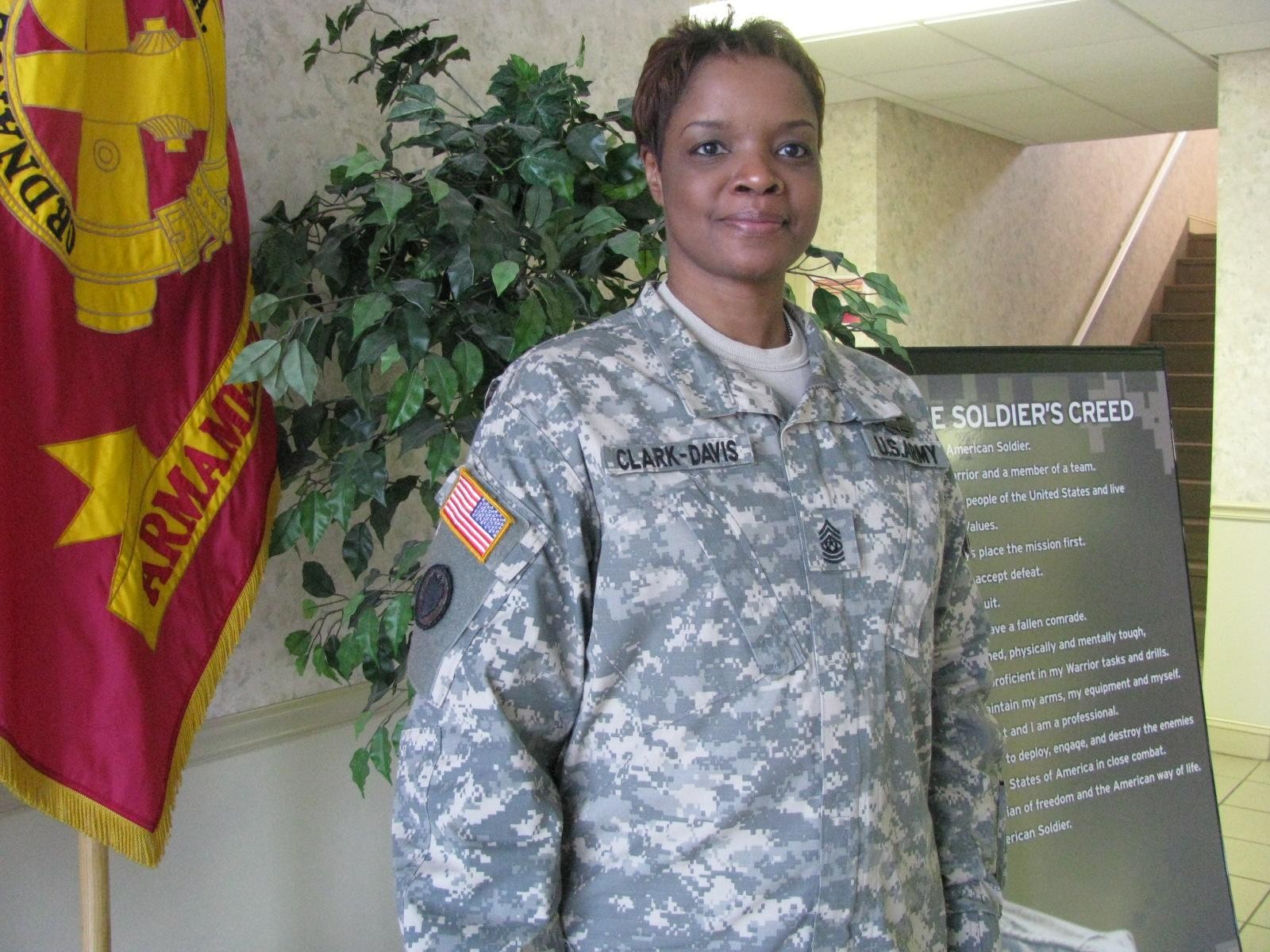Command Sgt. Maj. Angel Clark-Davis isn't really concerned about the motives that cause a Soldier to join the Army.
"Some join the Army to provide for their family and to serve. Some join to go to college and to serve. There are a lot of reasons. Each of those reasons comes with 'and to serve.' Soldiers have a desire to serve their country and to be part of something that's bigger than all of us," Clark-Davis said. "And they are a better person for that."
Clark-Davis does, however, concern herself with how a Soldier feels about the Army once they are enlisted. As the new command sergeant major of the 59th Ordnance Brigade, she is focused on ensuring that Soldiers under her command are enthusiastic about their job, trained to handle the professional and personal demands of the military, and confident that their senior command is working on their behalf.
"Our challenge is to help grow Soldiers," she said. "When they finally put their patch and crest on their uniform and they are technically a full-fledged Soldier, we want to make sure they really are a Soldier and they're ready for what a Soldier's life will require them to do."
While Soldiers assigned to the 59th Ordnance Brigade take classes in their military occupational specialty at the Ordnance Munitions and Electronics Maintenance School, Clark-Davis works to ensure they also maintain and refine their basic Soldier skills.
"When they leave here, they may go to a unit that is deploying in 30 days," she said. "We have a lot of things here - the roll-over Humvee trainer, the EST 2000 (weapon simulator) and the Warrior Training Unit - to teach Soldiers and to make sure they are ready for deployment.
"We must be battle ready. We are about training Soldiers and being prepared for deployment. We get paid to go and fight and win our nation's wars. Even while we sit in Garrison, our job is to make sure our Soldiers are prepared and trained to standards."
In her work with young Soldiers, Clark-Davis is always particularly amazed at their commitment to the Army and dedication to the mission.
"They are coming into the Army after we've been at war for seven years, going on eight," said Clark-Davis, a decorated veteran of Operation Desert Shield/Storm and Operation Enduring Freedom.
"Sometimes I sit back and wonder 'Would I have come into the Army while the country was at war'' These Soldiers are my heroes. They come in at a time of war and at a time when we will continue to be at war. Regardless of their motives, that speaks volumes about their character."
While being a Soldier comes first for Clark-Davis, she has another role that is particularly significant in the Army - being the first female command sergeant major of the 59th Ordnance Brigade. Throughout her military career, she has proven that women can succeed in the military, regardless of the traditional obligations they have to their families.
"A lot of females think they have to make a choice between being a good mom and being a good Soldier," she said.
"I was a single parent when I came into the Army. Whether you're married or single, it's hard. But you can do it. You can be successful at both. There are times when my daughter says to me 'Mom, I'm so glad of all the sacrifices you made so I could have opportunities' and there are other times when she says 'Mom, remember when you missed this or that'' It can be tough because the Army has to be your first priority. But you can do it."
Clark-Davis joined the Army in 1983, a time when there weren't a lot of female role models in the military. Yet, with unemployment high, only two years of college completed at Alabama A&M University, a baby daughter to support and a determination not to go on welfare, Clark-Davis saw the Army as a chance at job security and career opportunities.
"My primary goal was to take care of my daughter," she said. "The recruiter helped me look at the military occupational specialties that were open to women at that time. I didn't want to be a cook because I didn't want to be cooking every day. I didn't want to be a truck driver because I wasn't going to be changing tires out on the road.
"But the idea of being an ammunition specialist seemed like a good fit. And the advanced individual training was right here at Redstone Arsenal. So, that's what I chose and I've been an ammunition specialist for 26 years."
Clark-Davis did have a lot of family support as she juggled her military career and raised her daughter, Candy. Her sister, aunt and father all cared for Candy as Clark-Davis did three tours in Korea, served in Operation Desert Shield/Storm and answered the call of the Army wherever it took her.
"The Army does require you to have a family care plan, and I did have a good, solid family support system," she said of her early years as a mom and Soldier.
"Everybody is not that fortunate to have that kind of support. But the Army does an extremely good job of building a family in the military. And that family can step in where a Soldier's relatives can't or won't."
Today's Army offers plenty of female role models - including Gen. Ann Dunwoody, commander of the Army Materiel Command -- for women considering the military as a career choice.
"Women like Gen. Dunwoody have opened up a crack in the door to give hope to other female commanding generals who know they, too, can cross that threshold to make four-star," Clark-Davis said.
"I've been the first female command sergeant major in my last two jobs, and that is opening doors for other female Soldiers. I want Soldiers - male and female - to look at me and see they can be in my position someday, too. I think the Army is very fair in that it promotes on merit ... Women have a lot more opportunities to excel in the military than they do in large corporations. We don't have the imaginary glass ceiling in the Army. Everybody has a fair shot."
Through the years, the Army has rewarded Clark-Davis for her dedication. She has had exceptional mentors - most of them male - and has thrived in a military culture that follows strict policies to make sure all are treated equally despite race, gender or religion.
Clark-Davis has served at Fort Hood, Texas, Redstone Arsenal, Hunter Army Airfield, Ga., and in Germany and Korea. During Operation Desert Shield/Storm, she deployed in support of the 24th Infantry Division as they moved from Saudi Arabia into Iraq.
"Ammunition specialists provide all the ammunition in support of the war fighter," she said. "Every bullet that's fired from a gun or a helicopter or any arms-related equipment, we provide the ammunition for.
"During Operation Desert Shield/Storm, we were on the road behind the war fighter where we operated the corps storage ammunition supply point. We supplied on the go. The Soldiers would always thank us for our support. You can't be anymore prouder than that."
As a command sergeant major, Clark-Davis served in Operation Enduring Freedom in Afghanistan, where she was part of the 191st Ordnance Battalion's logistics task force charged with supplying ammunition, fuel, food and maintenance support to 13 forward operating bases throughout the country. She has also served as the command sergeant major of the Joint Task Force East in Romania and Bulgaria.
A Soldier leading Soldiers, Clark-Davis knows her own assets as a Soldier, and what it takes to be a good Soldier.
"My best strength is I really love the Army. But my weakness is that I want other Soldiers to love the Army as much as I do," she said. "Soldiers have got to love the Army enough to give it 100 percent.
"I love being around privates because you can just feel the energy. You can see their passion, their discipline and their desire to want to learn and grow as a Soldier. When you want to be a Soldier and you get a job in the Army that you really love, you are on fire and you are all lit up. That's a great Soldier."
Succeeding in the Army involves one core characteristic - discipline.
"If you are disciplined or you have the capability of becoming a disciplined Soldier, then the Army is for you," she said. "If you don't want to be told what to do, then it's not. Everybody is just not meant to be a Soldier.
"Some Soldiers come to us with discipline. Others come without discipline, but know that if they are going to be a better person they need to be in the military. Every Soldier has to have a desire to want to improve themselves."
Clark-Davis enjoys being a command sergeant major at the brigade level because she can influence change while still "getting out there and taking care of the Soldier." She wants to see the Army do even better at taking care of Soldier families and Soldier spouses, particularly male spouses, during deployments.
"I want to be a voice for Soldiers," she said, mentioning her plans to visit the brigade's other schools at Fort Gordon, Ga., Eglin Air Force Base, Fla., Fort Sill, Okla., and Fort Bliss, Texas.
"I want them to feel comfortable coming to me and talking about the good and even the bad, and asking for my opinion. I want them to know I'm representing them. I'm their command sergeant major, and I'm a voice for change."
Being assigned to Redstone Arsenal brought Clark-Davis home after serving five and a half years in Germany. She is from Tuscumbia, her husband of seven years is from Gadsden, and her daughter, who is now married, lives in Huntsville. Clark-Davis and her husband arrived in Huntsville just a few days before last Christmas.
"It was the first Christmas we've had at home in five years," she said. "With 26 years in the Army, there is a tendency to miss a lot of Christmases. Coming to Redstone Arsenal has been a real bonus for me and my family."
But, no matter where Clark-Davis is assigned, she is committed to giving her best to the Army.
"I'm still in awe that I'm here and I have this job. It's been something I've been working toward since I was a sergeant E-5 at Fort Hood," she said. "This rank is important to me. But I know that a private's rank is just as important to them as this rank is to me, and that my rank can be stripped just as their rank can if I do something wrong.
"To be a good Soldier you have got to love it. For all the things the Army and the Army leaders ask you to do and to give up sometimes on a daily basis you've got to love this stuff. You won't be able to do this job if your heart isn't in it."


Social Sharing